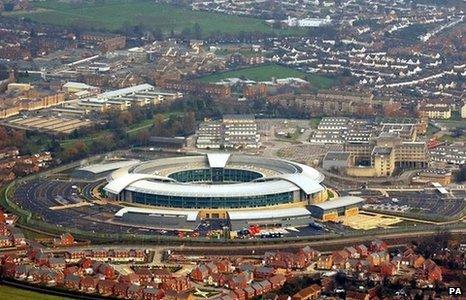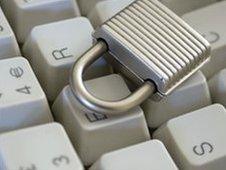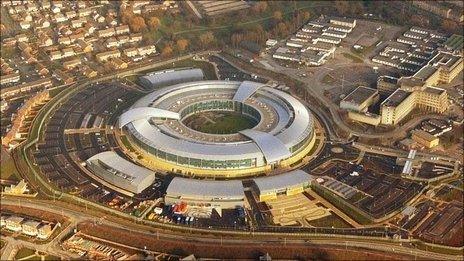Inside the UK's top secret GCHQ base in Cheltenham
- Published

Newsbeat had exclusive access inside the government monitoring station
Government Communication Headquarters, better known as GCHQ, is one of the most top secret sites in the UK.
Its high-tech offices on the edge of Cheltenham are surrounded by a two-metre high, razor wire-topped metal fence and dozens of security guards, as well as CCTV cameras and half a dozen vehicle checkpoints.
That's because it's where thousands of people work to help protect the UK from thousands of cyber-attacks every week, whether those attacks come from individuals, entire hacking groups or foreign powers.
Most of GCHQ's 5,000 staff are based at its Gloucestershire site, the same size as Wembley Stadium, in a building often referred to as the doughnut.
The body works with the security services known as MI5, as portrayed in the BBC show Spooks, and MI6 (think James Bond) to protect the UK's national security interests.
GCHQ won't confirm the specific kind of work that goes on there, but it is widely believed to have the capability of intercepting and listening in on things like phone calls, text messages and emails.
For obvious reasons, the public is told little about its work and it is rare for staff to speak in public about what they do.
Newsbeat has been given rare access inside the corridors of GCHQ's base to speak to 27-year-old Tom who works there. We are not allowed to give his full name for security reasons.
What exactly do you do for the government?
This is all about information, secretive information. The sort of information that is of benefit to the government or to military circles.
The sort of information where you need the highest level of clearance in government to be able to handle.
So that means gathering intelligence, listening in on phone calls and getting copies of emails?
I'm not going to comment on that.
What else?
The second part is the opposite of that. It's about preventing the UK from being the victim of the same thing. It's about the security of the UK.
It's about making sure government networks, government systems, systems of UK importance are secure against this type of attack. They're going to be the sort of systems that hold government data.
Where do most of the threats the UK faces come from: individuals, groups of foreign countries?

Keyboards can be more of a threat than bullets and bombs
Without going into specifics, the easiest answer is all of the above. We're in an environment where the person at home will have a computer and will have a smartphone.
In the old context of attacking a nation, it was done with guns, bullets and bombs.
Now we're talking about something that costs £200 from a high street shop. We're also talking about where the people under attack are not the soldiers in uniform in Afghanistan but instead people sat at home on their PC.
How many cyber threats do you deal with that the public never hears about?
It's going to be a lot larger than people think. But from our perspective, if we've done our job properly, you wouldn't hear about it.
How much is the cyber world the new front line of defence?
Cyber, or the internet, has become the new way of doing things. From low-level day to day activities like going to the shops, to paying for things on your credit card, that's done over the internet.
It's become such an integral part of what we do that if it were suddenly removed that would be quite a massive impact.
What's your average day like?
Like any job there'll be a fair amount of sitting behind a computer. But within the role I have at GCHQ there is a fair amount of travel involved.
Personally I've been lucky enough to never have been sent to Afghanistan but that's not to say GCHQ staff aren't there at the moment.
What should the public do if they are interested in working for GCHQ?
GCHQ will take a look at anyone that they think is good enough.
Specifically for us they should go to the GCHQ website, external. Or more generally there is the Cyber Security Challenge website, external.
- Published3 March 2011
- Published13 July 2011
- Published28 January 2011
- Published13 July 2011
